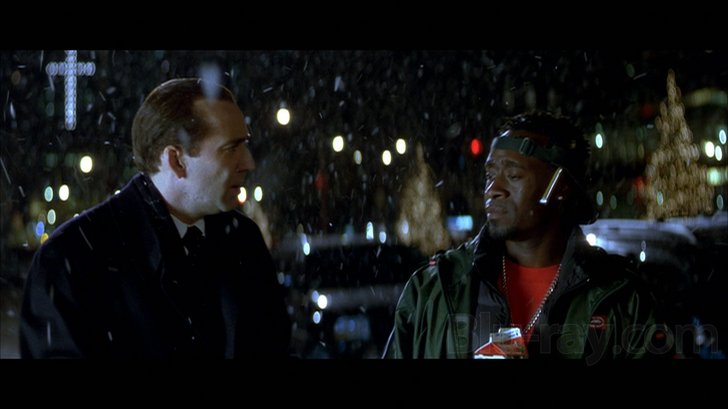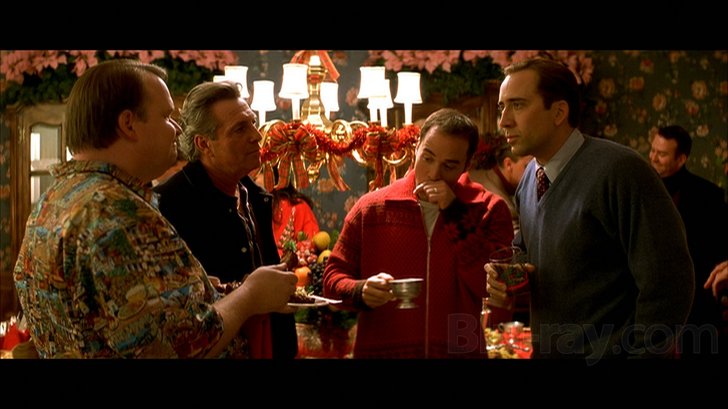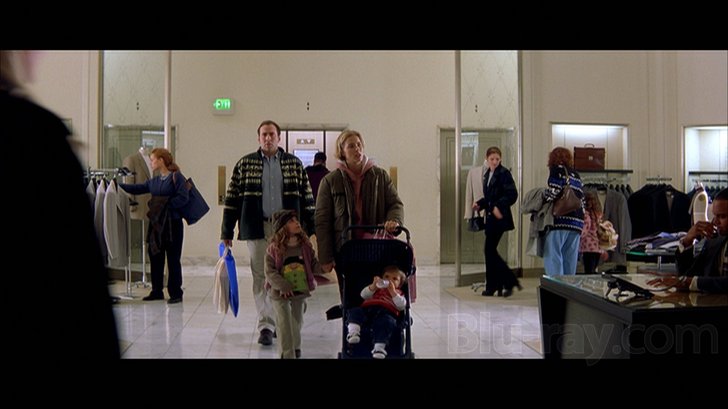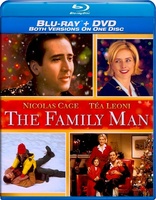The Family Man Blu-ray Movie
HomeThe Family Man Blu-ray Movie 
Blu-ray/DVD ComboUniversal Studios | 2000 | 126 min | Rated PG-13 | Oct 11, 2011
Movie rating
6.9 | / 10 |
Blu-ray rating
| Users | 1.3 | |
| Reviewer | 2.5 | |
| Overall | 2.5 |
Overview
The Family Man (2000)
Jack Campbell, a successful, talented and single businessman, has everything, or so he thinks. One day, he wakes up in a new life where he didn't leave his college girlfriend for a London trip. He's married to Kate, lives in New Jersey and has two kids. Jack's been granted a "glimpse" of a life he might have had. Is there anything there he regrets passing up?
Starring: Nicolas Cage, Téa Leoni, Don Cheadle, Jeremy Piven, Saul RubinekDirector: Brett Ratner
| Comedy | Uncertain |
| Romance | Uncertain |
| Holiday | Uncertain |
| Imaginary | Uncertain |
| Drama | Uncertain |
Specifications
Video
Video codec: VC-1
Video resolution: 1080p
Aspect ratio: 2.35:1
Original aspect ratio: 2.39:1
Audio
English: DTS-HD Master Audio 5.1 (48kHz, 24-bit)
French: DTS 5.1
Subtitles
English SDH
Discs
Blu-ray Disc
Single disc (1 BD/DVD)
DVD copy
BD-Live
Mobile features
Playback
Region A, B (C untested)
Review
Rating summary
| Movie | 1.5 | |
| Video | 2.5 | |
| Audio | 3.0 | |
| Extras | 3.5 | |
| Overall | 2.5 |
The Family Man Blu-ray Movie Review
You Do NOT Have a Wonderful Life, and We'll Prove It!
Reviewed by Michael Reuben October 14, 2011The Family Man is often described as "Capra-esque", but I suspect Frank Capra would have seen right through it. Capra genuinely believed in the small town virtues of Bedford Falls, whereas the makers of The Family Man clearly have no taste for the suburban New Jersey existence where their hero, Jack Campbell, is supposed to discover what's missing from his life. Otherwise, they wouldn't have to stack the deck by making the alternative to Jack's homey suburban life that of a cold-hearted Wall Street wheeler-deeler, as if there were nothing in between and no one who lives an urban existence could possibly fall in love, raise a family or be satisfied emotionally. Capra, at least, had the intellectual honesty to put his good man, George Bailey, and his bad one, Mr. Potter, in the same place and time and have them deal with the same people, so that it was clear that the different outcomes resulted from character, not circumstance. But for director Brett Ratner and his screenwriters, it all comes down to chance. Take a certain job, and you wind up a sleek corporate raider who makes everyone work on Christmas. Decline it, and you end up a harried paterfamilias with a mortgage, a dog, bags under your eyes, a loving wife and two adorable children. And Ratner's approach has a major drawback. In order to show you Jack's road-not-taken, he has to plunge Jack into an alternate life with which he isn't familiar and that Jack, for the most part, finds revolting (bad food, bad clothes, dull job, dumpy surroundings). Even if you find Jack's discomfiture comical (and I don't), what you have for much of the film's running time is the hero suffering miserably (and responding with appropriate criticism) in the very life that's supposed to show him what he missed by opting for success and comfort. Capra knew better. As much as George Bailey wants to travel and see the world, Capra made sure you never doubt that George loves his home town and its people, especially Mary. George questions his choices only in a moment of desperate crisis, whereas Jack has to have one manufactured for him by being kidnapped and stuffed into a life he chose not to lead. When he eventually embraces that life, is he really accepting other possibilities or just surrendering to Stockholm Syndrome?

"When did this jacket get a halo around it?"
In 1987, a twenty-something Jack Campbell (Nicolas Cage) and Kate Reynolds (Téa Leoni) say goodbye at the airport as Jack departs for a one-year internship at a financial firm in England. At the last minute, Kate asks Jack not to go, because she's afraid they won't survive the year apart. Jack assures her they love each other, and they'll make it. Thirteen years later, it's the morning of Christmas Eve, and Jack is bidding goodbye to the woman with whom he's spent the night. It isn't Kate. (I'll leave the details of the relationship for first-time viewers to discover, but her name is Paula, and she's played by Amber Valletta.) Jack lives in an exclusive Upper East Side co-op with an entire room devoted to his clothes. He drives a Jag and is president of the firm of Lassiter & Company, which is about to close a $130 billion deal. He has everyone working on Christmas Eve, including his harried underling Bob Cratchit, er, Alan Mintz (Saul Rubinek). And because this is a once-in-a-lifetime deal, he calls a meeting for the following afternoon (i.e., Christmas Day). But in that Jacob Marley, voice-from-the-past style that only happens in Christmas stories, his loyal secretary Adelle (Mary Beth Hurt) hands him a message from Kate, from whom Jack hasn't heard in years. Jack doesn't return the call, with the approval of his boss, Peter Lassiter (Josef Sommer). Instead he decides to walk home on Park Avenue through a light snowfall. Perhaps because he's feeling not quite himself, Jack intervenes in a dispute between a corner market owner (Ken Leung) and a character we'll come to know as "Cash" (Don Cheadle), because he's trying to cash in a winning lottery ticket. As a result Jack gets a gun thrust in his face, but he calms the situation and ends up walking down the street chatting with Cash. Who is Cash? The screenwriters are explicit in their commentary that they deliberately left his identity vague, which is an appropriate decision, because he's a meddlesome jerk. He's certainly no Clarence sent down from heaven in response to many fervent prayers offered up on behalf of Jack Campbell. (I doubt anyone, including Jack, thinks he needs help.) No, Cash belongs to some would-be bunch of do-gooders who go around trying to convince people that, no matter how well they think they're doing, they could be better. Depending on your predilection, you could analogize Cash's organization to a government bureaucracy, an environmentalist group or a religious movement -- but with a lot more clout. The next morning, Jack wakes up next to Kate in the suburban New Jersey home they appear to share with their two children, Annie (Makenzie Vega) and Josh (twins Jake and Ryan Milkovich). They've been married for thirteen years, she's a pro bono lawyer, he's a tire salesman working for Kate's father (Harve Presnell), and it's Christmas morning -- only Jack remembers none of this. As far as he knows, he still has a huge business deal to close. Gradually Jack discovers that Cash & Co. have altered history. Instead of taking the internship in England, he returned and stayed with Kate. This is the road not taken -- and it sucks. For approximately 80 minutes, we're treated to the sight of Jack floundering around in a world he barely understands, as he gets lost finding his way home, has to be told by his daughter where he works, doesn't recognize his best friend, Arnie (Jeremy Piven), gets hit on by the frustrated local wife who's been after him for years (Lisa Thornhill), can't find his own office at Big Ed's Tires, forgets his wedding anniversary -- and so on and so on. By the end, even Nicolas Cage, who's an expert at playing exasperation, has run out of new variations. Of course, the one good thing in all this mess is that Jack gets to see Kate again, and he also finds himself warming to the children they might have had. But after a few months, just about the time he's really starting to get attached to them, Cash yanks him out of this life and puts him back on Park Avenue, where Jack is astonished to discover that it's still Christmas morning (because the spirits have done it all in one night, get it?). He goes to the office, where the deal has hit a snag, but instead of untangling it, he goes looking for Kate. And wouldn't you know it? She's been living in Manhattan all this time. But she's about to leave for Paris where her law firm is moving her, and the film ends with Jack persuading her to stay and have coffee long enough for them to catch up. On the various commentaries, the filmmakers repeatedly congratulate themselves for their unsentimental and realistic ending, which would be fine if it weren't for the ridiculously sentimental and unreal remainder of the film. Yes, hard-charging professionals like Jack and Kate wouldn't suddenly throw over their careers to run into each other's arms at the end of the film. But people who become such professionals are hard-wired for type A behavior, and we see that clearly when Lassiter, Jack's boss from real life, comes into Big Ed's to buy tires, and Jack turns the encounter into an employment opportunity. People like that don't easily become the harried suburban caricatures that Ratner and his screenwriters want us to believe Kate and Jack turned into. They adapt and refocus, and if Wall Street and the city is where they want to be, that's where they keep aiming. As you sit and watch Cage's Jack cluck with disapproval over the clothes in his tiny suburban closet or choke on the grocery store food at the neighborhood party, it's hard to escape the suspicion that the real nightmare being played out here is that of the Hollywood player, who lives in fear of being one flop (or one missed phone call) away from being cast out of the penthouse suite and the reserved table at the latest hip restaurant and returned to whatever mundane slice of Americana he came from. And that isn't Frank Capra's territory. It's closer to Billy Wilder's.
The Family Man Blu-ray Movie, Video Quality 

This 1080p, VC-1-encoded Blu-ray is another disappointing effort from Universal on a catalogue title. Black levels are good, colors are decently saturated with reasonably accurate fleshtones, and the source material is in good shape. However, detail is less fully resolved than it should be on a first-rate Blu-ray image from source material of this vintage. The lack isn't especially noticeable in close-ups, and it can easily be overlooked in medium shots, but it's hard to miss in long shots, especially those involving complex cityscapes, crowds of people and/or offices littered with papers and equipment. Distant objects in the frame are identifiable but indistinct, and anyone familiar with the camerawork of The Family Man's cinematographer, Dante Spinotti, knows to expect better results when his anamorphic widescreen photography is properly transferred to high-definition. A frequent and unwelcome companion to such a loss of detail is edge enhancement, and that too is on display here. A particularly severe example occurs in an early scene where Nicolas Cage's Jack Campbell is running a meeting in a conference room. Jack appears to be wearing two suit jackets, one made of cloth, the other of ectoplasm. I have included an illustrative screenshot and a number of others where EE intrudes its unwelcome presence. (You may need to expand the screenshots to their full size to see it clearly.) Now, I freely admit to being less sensitive to EE than others, which means that if I noticed it, it must be bad. Still, I found it less distracting on The Family Man than the lack of detail for which it's supposed to compensate, but since these problems are really two aspects of the same fault in the transfer, it's six of one, half dozen of the other. (Note: I list my equipment on my reviewer page, but for the record, I watched this disc on a 72" screen from app. 10' away. People who view this disc on a smaller screen (e.g., 36") may not see these problems, but that doesn't mean they aren't there. Especially in an era where 2K projection is becoming standard in movie theaters, a Blu-ray that doesn't look equally good when projected at all sizes is a flawed product.)
The Family Man Blu-ray Movie, Audio Quality 

There's nothing special about the DTS-HD MA 5.1 mix. It renders the dialogue clearly and gives a pleasant musicality to Danny Elfman's score. Foley for such elements as street traffic, office noises, shopping mall backgrounds and bowling alley sounds comes through effectively, but this is a front-oriented mix with no sustained effort to immerse you in a surround field. Bass extension is moderate, as there are no effects that require it to be deep.
The Family Man Blu-ray Movie, Special Features and Extras 

The extras have been ported over from the 2004 "collector's edition" DVD. They also appear on the flip-side DVD version, which replicates the 2004 release. (Universal is re-releasing the 2004 DVD disc in a standalone package with the same cover art as the Blu-ray.) Omitted from the Blu-ray side are the production notes, cast and filmmaker bios, DVD-ROM material (including the script), and "Choose Your Fate" quiz, where answering a series of questions leads to a generically applicable quotation. However, all of these remain available on the DVD side.
- Commentary with Director Brett Ratner and Writers David Diamond and David Weissman: The director and the two writers talk continuously about all aspects of the film and its production. Probably because of the presence of the writers, a substantial proportion focuses on the film's themes. A revealing moment occurs when Ratner notes that his version of Jack Campbell's "glimpse" is of himself if he hadn't attended NYU Film School. He'd probably be living at home on his mother's couch making films in his backyard with friends; instead, he's making big studio movies with Nicolas Cage and Téa Leoni.
- Commentary with Producer Marc Abraham: Near the beginning, Abraham makes a point of correcting those critics who failed to understand that Jack isn't a Scrooge, but a good man who is happy with his life. Ratner and the writers urge much the same interpretation in their commentary. Then again, Scrooge was perfectly content with his life until Marley's ghost and the three spirits that followed gave him a "glimpse" of his past, present and future. If Jack Campbell is really so happy with his life, why does his vivid "dream" of an alternative prompt him to blow off a $130 billion business deal to spend the evening drinking coffee with an ex-girlfriend he hasn't seen in thirteen years? Abraham also notes near the end of his commentary that he was asked many times why they couldn't bring the kids back at the end of the film. His response was always that he'd be happy to do so, if someone could explain to him whose kids they were.
- Isolated Music Score with Commentary by Composer Danny Elfman: Elfman's comments are so sparse that they're barely a commentary. They occur sporadically at breaks in the score, but many such breaks contain nothing but dead air. When Elfman does speak, he focuses on his thematic strategies.
- Deleted Scenes (SD; 2.35:1, non-enhanced; 13:32): There are nine scenes. One is especially noteworthy for showing a mother-daughter relationship between Kate and Annie that is largely absent from the finished film. Another features a brief appearance by Paul Sorvino as a potential major customer that Big Ed wants to land.
- Opening Scene with Alternate Music Track (SD; 2.35:1, non-enhanced; 1:14): For a long time, the film's opening was set to Perry Como's version of "It's Beginning to Look a Lot Like Christmas". This is that version.
- Outtakes (SD; 2.35:1, non-enhanced; 8:14): Not the usual blooper reel, but a series of long, uninterrupted takes in which things keep going wrong (usually, giggle fits).
- Spotlight on Location (SD; 1.78:1, enhanced; 20:01): This is an EPK produced at the time of the film's release, but it's more informative than the usual EPK, especially on the subject of how Ratner came to direct the film and how he persuaded Cage to star.
- "Hi, Jack" Montage (SD; 2.35:1, non-enhanced; 0:40): A series of greetings, edited together in rapid fire. It looks like something created for a wrap party.
- Seal, "This Could Be Heaven" Music Video (SD; 2.35:1, non-enhanced; 5:05): The song plays during the closing credits.
- Theatrical Trailer (SD; 1.78:1, enhanced; 2:32): The single best part of the trailer is the use of Talking Heads' "Once in a Lifetime". The single most misleading part, especially after listening to the commentaries, is the tagline: "What if you got a second chance?"
- My Scenes.
- pocketBLU™.
- BD-Live.
The Family Man Blu-ray Movie, Overall Score and Recommendation 

Perhaps the greatest sin of The Family Man is that it spends over half its running time getting us invested in Jack's developing relationship with an adorable moppet named Annie, only to whisk her permanently out of existence at the end of the film. The equivalent would be discovering, in an M. Night Shyamalan twist at the end of It's a Wonderful Life, that Zuzu doesn't exist, along with the rest of George's and Mary's kids. As we leave Frank and Kate chatting over coffee and considering the possibility of picking up where they left off thirteen years ago, you really have to wonder what's going to happen if they do end up having children together. Will Jack be forever scanning the faces of those children, looking for some sign of the dream offspring that Cash showed him? Are Jack's future kids -- not "glimpses", but flesh-and-blood beings who feel, suffer and have to live with the consequences of their parents' choices -- doomed to see disappointment in their father's face when he looks in their eyes and doesn't find what he's expecting? These are not unreasonable questions to consider at the end of a film that is entirely based on what-ifs and alternative scenarios, and plays fast and loose with all of them. I'm aware that The Family Man has its fans, and for them it doesn't matter what a reviewer thinks. For everyone else, I recommend renting first. As far as the Blu-ray's quality is concerned, definitely rent first.
Similar titles
Similar titles you might also like

The Best Man Holiday
2013

How Do You Know
2010

Bridget Jones's Diary
2001

What to Expect When You're Expecting
2012

Man Up
2015

She's Having a Baby
1988

Love Actually
2003

Son in Law
1993

The Holiday
2006

Dan in Real Life
2007

Sydney White
2007

Raising Helen
2004

Bridget Jones's Baby
2016

Life as We Know It
2010

Mona Lisa Smile
2003

The Devil Wears Prada
10th Anniversary Edition
2006

Crazy, Stupid, Love.
2011

Crazy Rich Asians
2018

Nothing Like the Holidays
2008

How to Be Single
2016

